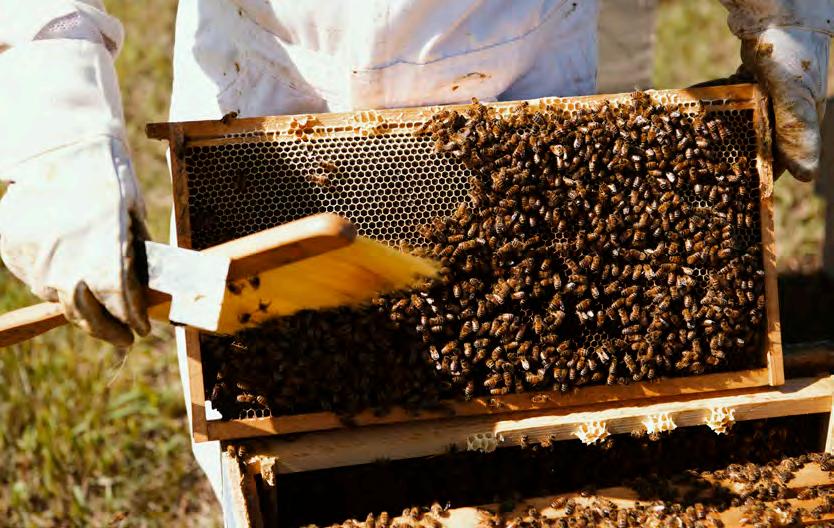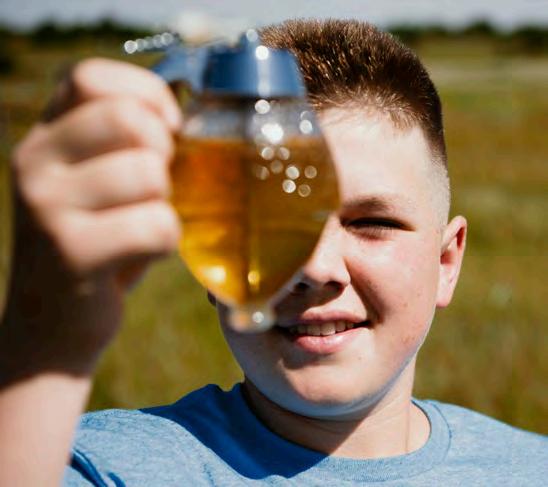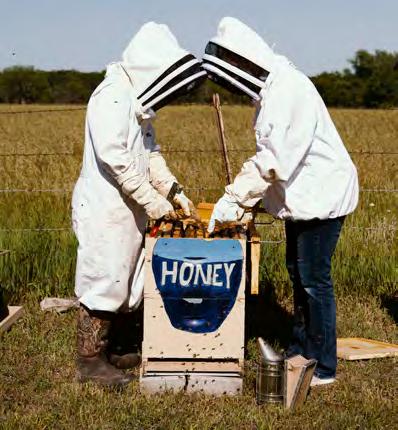
10 minute read
Ox’s Bees
At 14 years old, Maddox “Ox” Shively is not only doing his part to protect one of the most vulnerable creatures alive but creating a thriving business at the same time.
Bees Ox’s
BY ASHLEY WALKER WITH ANDERSEN JACKSON
The sight of over 140,000 honey bees would send most people running for their lives, but for one Emporia boy, the massive swarm of insects is just a sign of sweet success.
Fourteen-year-old Maddox Shively is a beekeeper. Not a typical first job for most kids, but then again, Maddox (“Ox”), isn’t your typical kid.

It all started in third grade.
“I read in Time for Kids that bees were endangered,” he said. “And I wanted to fix that.” So, with all the optimism and enthusiasm of an 8-year-old, he came home from school that day and told his parents that he was going to be a beekeeper.
“They thought I was crazy…. that it was just a phase,” he said.
But it certainly wasn’t a phase. Not long after the plight of the honey bee gripped his heart, Ox started making plans to do something about it. He applied for a scholarship through the NEKB (Northeastern Kansas Beekeepers’ Association) and with some persistence, the second time around (he was too young the first time) he got it. The scholarship (awarded to only three youth across the state) included everything he would need to get started beekeeping: one hive box, a suit, and the necessary tools and equipment to manage a hive.
Four years later, Ox has seven hives, approximately 140,000 bees, even his own YouTube channel, and a business to call his own – aptly named, “Ox’s Bees.”
And they are, indeed, Ox’s bees.
Every part of the business, from research to production; from marketing to managing employees (yes, he has one employee – his older
sister, Alexa), “Ox’s Bees” is Ox’s business.
“There is no doubt he is the CEO,” said Shane Shively, Ox’s dad. “He is the expert.”
There aren’t too many times when a kid knows more about a subject than his parents, Shane pointed out, but in the case of beekeeping Ox definitely has them beat.


Ox learned the basics of beekeeping through the NKEB scholarship program which included monthly meetings, an extensive beekeeper start-up class, and with the help of a mentor in those early days of getting his hives going. Beyond that, Ox continues to do a lot of research on his own and does what most beekeepers do: network with other beekeepers in the area, learn from them, and share ideas and support one another in a hobby/ business that sometimes isn’t an exact science.
“If you ask twenty different beekeepers you will get 20 different answers,” said Mary Shively, Ox’s mom. It’s just the nature of beekeeping.
But what most beekeepers all have in common is a desire to protect and save the honey bee. And like Ox, the reward for their labor is, of course…..honey!
“My goal was to save [the bees] but honey kind of just came with it.”
OH, HONEY!
Come late July and early August Ox reaps the reward of his – and the bees' – labor when he finally gets to harvest the combs and sell the honey by the 16 oz. jar.
But buyers better be quick. Last year his 24 pounds of raw honey sold out in 6 minutes via a Facebook post on his mom’s page.
The demand is real. His dad remembers that day well:
“Last year, as people were filling out the information, it was like a casino,” Shane said, chuckling. “People were lighting it up. We thought we had oversold.”
Fortunately, they hadn’t and Ox’s customers, who each love his honey for their own reasons, were able to receive the coveted product that is known to be one of the healthiest foods a person can consume.
Locally sourced honey, like Ox’s, has long been known to provide a number of health benefits, including helping

to ease symptoms related to allergies.
That’s why the Dewitt family of Emporia use Ox’s honey:
“We battle allergies at our house and people say that locally raised honey is a natural remedy to help subside allergies,” said Brian Dewitt.
Still, others like it because, well, it just tastes good.
“When he first started this, I bought a couple of jars, thinking, oh, you know, I’ll help


the kid out,” said Rosemary McGuire, another of Ox’s customers. “But that’s the best dang honey I’ve ever had.”
Rosemary McGuire loves Ox’s honey drizzled over her toast.
“I told him I don’t know what he feeds his bees but it’s fabulous.”
THE HIVES
Ox’s hives are located northwest of town at the end of a long mowed path in the back of his aunt and uncle’s rural property. Depending on the time of year, Ox visits the hives several times a week to check them and make sure they are healthy and thriving.
What any beekeeper looks forward to the most during the year is late spring/early summer when the “honey flow” begins. Ox will add “honey supers” to the hive (extra trays that encourage honey production) and if all is well inside, he should produce several gallons of honey per hive come harvest time.
When production time rolls around, usually late-summer, Ox will pull the combs and bring them to town where he and his family will work together to harvest the honey in the confines of his garage. According to Ox, It is important to do the honey harvesting well away from the hives themselves, otherwise, the bees will follow the scent of the combs….and they won’t be too happy about it. (When there’s honey in the hive, bees are intently protective and they can get aggressive.)
Speaking of the nature of bees most people are familiar with, one question he often gets is, “Have you been stung?”
Perhaps a person can’t truly call themselves a beekeeper until they’ve experienced what it’s like to be stung. But yes, Ox has been stung – only once or twice, though – and lived to tell about it. His mother, on the other hand, has been stung multiple times. (The likes of a storyline right off the pages of Winnie the Pooh, it is just best


told by her.) Ox claims bees can sense fear. Although, some keepers say some people just have “scents” that some bees don’t like.
Whatever it is, fortunately for Ox, his bees seem to like him pretty well….and he seems to like them, too.
Of course, Ox always “smokes out” the hive to calm them down and wears his protective bee suit. The head-to-toe polyester suit that resembles that of an astronaut is the safest way – although not foolproof – to interact with the bees. It does give a layer of protection, but a mad honey bee has been known to sink his stinger right through if given the chance.
“BEE-ing” CAREFUL
There is, however, only so much a beekeeper can do to “save the bees.” While Ox’s hives provide an optimal environment for them to do their “business,” there are other factors that are out of his control.
The weather, for example. The winter months can be devastating to a hive if efforts aren’t made to keep the hive protected. Ox has made a wind block for his hives that helps keep the bitter winter north wind from freezing the hives to death. So far, he’s only lost two hives due to cold temperatures.
Similarly, beekeepers count on the springtime rains for good pollen production. The more rain, the more flowers; the more flowers, the more pollen; the more pollen, the more bees; and the more bees, the more honey.
The use of pesticides on lawns and fields is another factor that threatens the lives of honey bees.
“Whenever you treat your grass, bees die from that,” he said.
It’s a big problem and one that Ox is constantly trying to educate people about. Pesticides, like neonicotinoids, are designed to kill unwanted weeds in yards and fields, but many of these “weeds” are great sources of pollen for bees. Dandelions, for example, are one of the very first sources of pollen available once winter is over. (So, the next time you are tempted to spray weedkiller on those “unsightly” yellow blooms in your lawn, think twice. Those flowers could make the difference between life and death for honey bees during those early days of spring.)




BEYOND THE BEES
Not only has the bee business been a great way for the middle schooler to earn some extra money (he hopes to buy his first car someday) and learn how to be an entrepreneur, it has given him experience in leadership and public speaking.
Third-grade teacher Kala Olivier – whose classroom is where it all started for Ox – has invited the young entrepreneur to come back and talk to her students about the bee-keeping business. She appreciates the role model that he provides to them.
“It’s been amazing to see his curiosity and he’s come back and actually talked to my students about it,” she said “It’s so cool to see where one spark of curiosity can take you.” I’m so proud of him…..and I love seeing his leadership with this and I know that he will use these skills and apply them to his future endeavors.”
In addition to visiting classrooms in Emporia and surrounding areas, it is not uncommon for Ox to do presentations on bee-keeping to adults and college students across the state.
“It has just been really fun to watch him blossom as a public speaker and represent himself, ” Mary said.
According to Joli Winer, the Youth Scholarship Chairperson for NEKB, Ox is a great example of what they hope young beekeepers will do with the youth program.
“We typically have six to eight kids every year get started in beekeeping, some stick with it and some don’t,” she said. “Maddox immediately was quite different…..he really took the entrepreneurial spirit to a new level.
“He’s done a great job of encompassing what we hope to see all of the kids get out of the program.”
As for what’s next for the young beekeeper, Ox hopes to continue to add a few more hives to his business in the coming years, while being careful to continue to produce a high-quality product and maintain a good work/life balance.
Wise beyond his years, Ox knows what it will take: “I don’t want to let down the bees, but I also don’t want to let down my customers.”
But knowing Ox, that would “bee” highly unlikely.
For more information about Ox’s Bees or to watch Ox in action as a beekeeper, visit his YouTube Channel: Maddox Shively Beekeeper.









